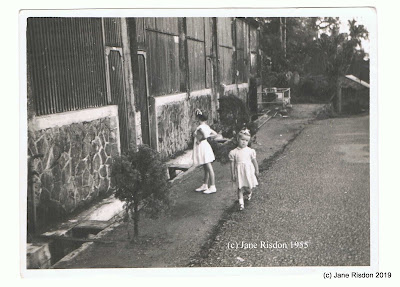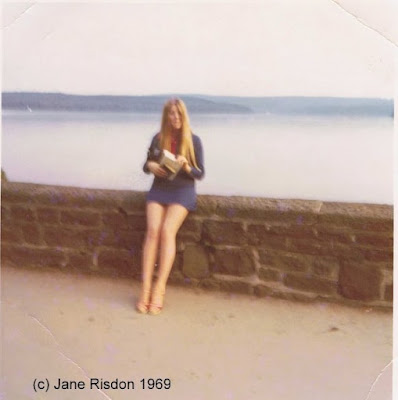This week, we
welcome Jane back to the Scribbler. She was a featured guest recently with a
short story in our SHORTS pages.
She was a guest
last year when she talked about her stories and if you missed it, please go HERE.
Today she’s
going to tell us the Story Behind the Story.
Read on, my
friends.
Jane Risdon is the co-author of ‘Only
One Woman,’ with Christina Jones (Headline Accent) and ‘Undercover: Crime
Shorts,’ (Plaisted Publishing), as well as having many short stories published
in numerous anthologies. She writes for several online and print magazines such
as Writing Magazine, Electric Press, and The Writers’ and Readers’ Magazine.
She is a regular guest on international
internet podcasts including UK Crime Book Club (UKCBC), Donnas Interviews
Reviews and Giveaways, and on radio shows such as theauthorsshow.com,
chatandspinradio.com, and The Brian Hammer Jackson Radio Show.
Undercover: Crime Shorts is being used
by Western Kentucky University, Kt. USA, in an Introduction to Literature Class,
for second year students from Autumn 2021 for the foreseeable future.
Before turning her hand to writing Jane worked in the International Music Business alongside her musician husband, working with musicians, singer/songwriters, and record producers. They also facilitated the placement of music in movies and television series.
Earlier in her career she also worked for the British Ministry of Defence in Germany, the Foreign and Commonwealth Office, London.
Working
Title: The Matryoshka
Files: A Lavinia Birdsong Investigation
Book 2 in my
series featuring former MI5 Intelligence Officer, Lavinia Birdsong.
Synopsis:
MI5 Intelligence Officer
Lavinia Birdsong was given the option of taking voluntary retirement or face
the sack and loss of her pension after twenty years working her way up the
Security Service. She’d had her eye on being the third only ever, female
Director General but all that went south when she chose retirement.
Determined
to inveigle her way back into MI5 and to find out why she was given the elbow —
after a year she still hasn’t a clue why she was given the ultimatum upon
return from a joint MI5/MI6 operation in Moscow — she’s already investigated
and solved the case of a missing woman in her locality, but without any
indication from her former boss that he would give her even the slightest hope of
reinstatement, and despite aiding MI5/MI6 to track down and capture Russian
Mafia (Bratva) and Pro-Russian Ukrainian Separatists, Lavinia’s aspirations of
working at Thames House again, seem a distant dream in the first of my series,
Ms. Birdsong Investigates: Murder in Ampney Parva.
When her
home is broken into a year later, and sensitive USB files are stolen from her
ultra-secure safe — which operates with a scan of her thumb print — and her
young cleaner, Mercy Farthing mysteriously disappears at the same time, Lavinia
finds herself investigating everyone around her. Things get dangerous for the
former Intelligence Officer, and for her colleagues, as they try to help her
find out who has her files and why. Bodies are mounting up; the pressure is on,
and time is running out.
The
Matryoshka Files will be dynamite in the wrong hands.
The
Story Behind the Story: Since
I was old enough to take adult books out of the library I’ve read authors of
crime, thrillers, mysteries, and espionage. From Agatha Christie to John Le
Carrè, Stella Rimington, Frederick
Forsyth, Leslie Thomas, Mickey Spillane, Michael Connolly, Peter James, Kathy
Reichs and so many others, I’ve devoured their writing. I dreamed of writing,
and I hoped one day I could write similar books.
Before my career in the International
Music Industry, working with musicians, singers, songwriters, composers, record
producers, and facilitating the placement of music on Movie and TV soundtracks,
and my marriage to my musician husband, I worked for Government departments as
a Civil Servant. Not my first choice of
a career, I wanted to be a War Correspondent, but my family moved to Germany
before I could realise my dream.
My first position was with the British
Ministry of Defence (MoD), in Germany in the late 1960s, on an army base which
was in a village at the heart of the flooding resulting from the bombing by the
Dam Busters in World War Two. It was a fascinating experience.
I also lived in Germany from 1957-1960
and we lived on very secure army base, not far from bomb sites, and we children
had an armed guard taking us to and from school. The War was still very fresh
in evidence around us. We were warned about the Russian Secret Police who hung
around in bars not far from the gates of the base, hoping to kidnap or entice
British soldiers into defecting.
Our regiment was there as part of the
protection afforded Germany against the Soviets. We were a Guided Missile
Regiment — we had weapons with us to act as a deterrent. At first, we were not
welcome, understandably.
Upon arrival in Germany, by boat, the
families were stranded on the boat for hours because of demonstrations against
us by Germans. We eventually disembarked on to coaches to take us to the
railway station where we were to get trains to Dortmund where we were to live.
However, once on the coaches, demonstrators blocked our way, rocked the coaches
side to side and generally terrified us all. After a few more hours, we were
able to make our way to the train. More demonstrations and frightening behaviour
before we boarded the trains and when we arrived in Dortmund.
Welcome to life in Germany in the
later 1950s. We were spat at in the street, chased by women with brooms
shouting, ‘go home Englander,’ and prams were overturned with babies in them.
An interesting time. But eventually we kids played with German kids on the bomb
sites and had quite a fun time. I met black American GI’s and their children
with whom I played. Having just left Singapore, where I lived as a toddler, and
where we mixed with Chinese and native Singaporeans daily, it just goes to
prove kids are kids and will get on with being mates without any prejudices or
political awareness.
During my time there in the late 1960s
I met and worked with many local Germans — and was entertained in their homes —
with whom I’ve made life-long friends. The Sergeant’s Mess was situated in the
building where Nazi, Herman Goering, gave many of his speeches. The whole area
is steeped in history and my imagination ran riot.
I met people from Eastern Germany who
had escaped in hay carts under a hail of bullets, and families who went to
Berlin and the Berlin Wall, every Christmas, to see if the names of their
brothers and fathers were on lists provided by the Russians, of German soldiers
— prisoners of war — who were being released from Siberia, or who had finally
died. These soldiers had often been taken as teenagers in the middle of the
night by the Hitler Youth to join their organization. Their families were
forced to allow them to go under pain of death. I soaked up all these stories;
one day I might use them.
I transferred to the Foreign and
Commonwealth Office in Whitehall and found myself in paradise. Not only when
the ‘Swinging Sixties,’ was at its height, but the Cold War was too. When I
first lived in Germany the Berlin Wall didn’t exist. When I lived there in 1968
its consequences dominated Germany.
Working at the FCO during the Cold War
was manna from heaven for a would-be crime and espionage writer.
Those who have read about my life
before will know that I worked there at an amazing time. The person who
Positively Vetted (PV) me regularly, from Special Branch, was a commander who
had tracked down and arrested the Soviet husband and wife spies, Peter and
Helen Kroger, who were in fact Americans. They were part of the Portland Spy
ring, and my ‘Vetter’ would tell me about them and others he’d been involved in
bringing to justice.
Whilst I worked there, over one
hundred Soviets were expelled from their London Embassy on suspicion of spying.
Moscow then expelled a similar number of our Embassy staff in retaliation.
I worked in a section which dealt with
people alphabetically, and one such person was our Ambassador to Montevideo,
Uruguay, Geoffrey Jackson. He was kidnapped by extreme leftwing guerrillas —
known as Tupamaros guerrillas — during my time and spent eight months in
captivity before a ransom was paid for his release. The FCO worked day and
night to keep his family, and everyone updated, and to strive for his release,
which, for a young aspiring writer was mind-blowing.
All this inspired my Ms. Birdsong
crime series, although I don’t draw upon actual events and her stories are more
current. I have always been fascinated by Mafia, whether it is Italian/Sicilian
or Russian, and the workings of MI5 and MI6. The FCO in the 1960s meant the
Security Services worked closely with the department. I loved it.
Today, MI5 and MI6 are often involved
in operations involving ISIS, Russian, and other Mafia, and Organised Crime
Groups, and it is this area I have researched for Ms. Birdsong. As the series
expands, I am planning to delve further into espionage, but for now her stories
are about MI5/MI6 and Organised Crime and how its activities finance rogue
states and fighters such as Pro-Russian Ukrainian separatists. I began this
series long before Russia invaded parts of Ukraine.
My series, Ms. Birdsong Investigates
has been a joy to write.
Book one — ‘Ms. Birdsong Investigates:
Murder in Ampney Parva,’ is in with my agent.
Book two (being rewritten now to
accommodate changes at MI5 and in Ukraine) is called ‘The ‘Matryoshka Files: A
Lavinia Birdsong Investigation’.
Book three is also being re-written
for the same reasons, updating. It is called, ‘The Safe House’: A Lavinia
Birdsong Investigation.
My agent is patiently awaiting books
two and three. I need a clone.
If my crime writing interests you,
please check out ‘Undercover: Crime Shorts,’ and various anthologies for which
I have written. I’m a multi-genre writer so you will find a mix of genres in
them as well as crime stories, and of course, my co-written novel with
Christina Jones, ‘Only One Woman,’ is about life in the late 1960s UK music
scene, with a love-triangle at its heart.
Thanks, Allan for inviting
me to share my ‘Story behind the Story.’ It has been a blast.
Website:
https://janerisdon.com
A question
for you before you go, Jane:
What
is your favorite part of writing and the part you enjoy the least?
I wish
someone could type it all up for me. I hate typing it all. But, most of all I
hate editing. My own edits to begin with, then waiting for an editor to send
their findings back. It’s such a big delay in getting the story out there.
It’s a
pleasure having you as a guest, Jane. Thanks for sharing the SBTS.
Thank you to
all our visitors and readers. Feel free to tell us what‘s on your mind in the
comment box below.

.jpg)










.jpg)
8 comments:
Jane had led such an interetsing life, I'm not surprised that she is writing these exciting stories. She has so much material!
Thanks so much for your kind comments. I try!!
Allan, I tried to leave a couple of comments without success. Hope this works. Thanks so much for having me on your fab blog again. I really enjoyed it. I hope your readers enjoy my contribution and you get lots of new followers and interest in your blog. Have afab day xx Jane Risdon
Sorry you are having trouble with the comment box, Jane. This one came through perfectly. You are always a popular guest and thanks for being part of the Scribbler.
Allan, I managed using my Google account, it will not accept me as my website and gives the option of Goodle or anonymous. So went for Google.
What a challenging childhood you had! Your experiences then and later give you a solid background for your writing. This is a fascinating interview. Thanks.
Appreciate the comment, Anne. Thanks for visiting.
Anne, thanks so much. Yes, challenging childhood because one could never make friends, always on the move after a few years. Also, changing schools constantly was not fun. But, the upside is that I saw the world, even if a little young to appreciate it, and it made me aware of differing peoples and cultures and to accept people for who they are and not what they are. Travel later with my husband and his band and also when we took on management of recording artists, etc, also broadened our horizons and having been overseas much of my young life, I especially, managed to cope with changes. Have a fab Sept. Thanks for your kind comments.
Post a Comment